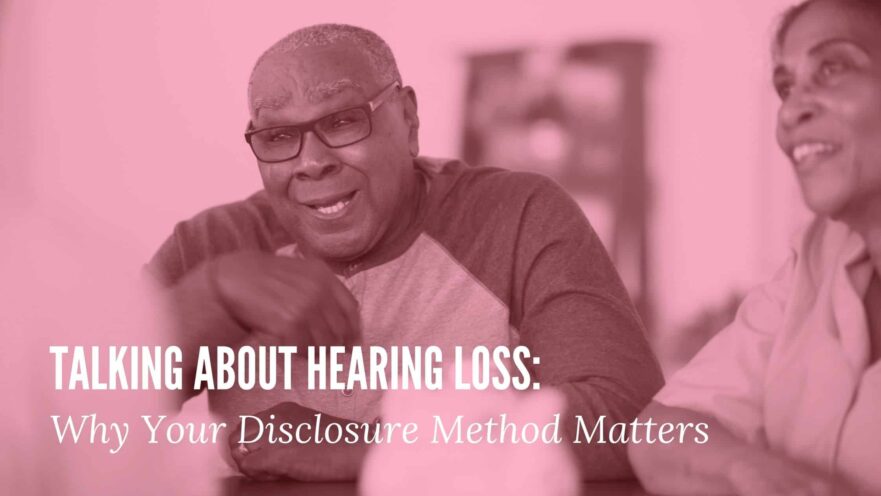Have you ever heard of the phrase “It’s not what you say, but how you say it”? Well, this truism can now also be applied to telling others about your hearing loss. That’s according to a study conducted by the Massachusetts Eye and Ear, a research center that is part of Harvard Medical School. The study looked at 337 patients who had hearing loss, giving them a 15-question survey to get information about what patients said when they spoke about their hearing loss to others. They found that respondents generally used one of three strategies with each utterance.
A difference in disclosure strategy
There were three types of disclosures identified:
Non-disclosers usually didn’t let anyone know of their actual hearing loss. Still, they implied to others that they were the ones who needed to improve communication. Phrases like “I can’t hear you” and “Please speak up” were most often uttered by this group.
Basis disclosers are those who did admit to others that they had a hearing loss and usually gave a reason for it. Crucially, however, they neglected to guide the other person on how best to communicate with them.
Multipurpose disclosers both admit their hearing issues and recommend to the other person the best strategy to foster smoother communication. This could be as simple as asking that person to talk on your left side as you might not hear as well out of your right ear.
Following the result of the study, the senior author and otologic surgeon Konstantina Stankovic recommended that hearing aid users use the multipurpose strategy as it “may help them gain the confidence they need to disclose their hearing loss and improve communication with others,” She saw it empowering for healthcare practitioners to educate patients about different ways to disclose your condition to those around you.
“Hearing loss is an invisible disability; however, asking people to slow down or face someone with hearing loss while speaking may improve communication,” she said.
Women are more likely to be multipurpose disclosers.
The survey results also indicated that women use multipurpose strategies twice as often as men, suggesting that women find it easier to get the help they need in challenging social situations. Women got the help and support they needed after disclosure.
Men, on the other hand, made mostly basic disclosures. This makes sense since men are typically less likely to show vulnerability and ask for help even when they need it. However, the research shows that men may be doing themselves a disservice by refusing to ask for help. Isolation and a loss of confidence can quickly grow from not being able to hear those around you.
Could you improve your multipurpose disclosures? Here are three areas you need to consider:
Disclosing to Loved ones
Your immediate friend and family will often be the first to notice your condition (even before you do) and will likely be the most supportive. If you are ready for hearing aids, you can ask them to come with you to the audiologist screening. They will serve as vital support and will round out information about how hearing loss impacts your lifestyle.
As for your partner, it’s a cliché to say that communication is the bedrock of a relationship, but it is true. That is why you need to keep the communication lines clear with your loved one. You can explain what sounds are difficult to hear and what they can do to make it easier.
Disclosing at Work
Talk to your boss about your hearing loss, and explain how it affects your job. Don’t expect them to know what to do with this information. Ask them to consider putting you in front of the main speaker during meetings or assigning someone to provide post-meeting notes. This will minimize the possibility of you getting in trouble due to missed information in a meeting.
As for co-workers, they must know as quickly as possible as you will be teaming up with them on often essential tasks. For work-related communication, ask them to email or speak to you in person before using the phone.
Disclosing to Strangers
You don’t have to tell every stranger you meet about your hearing loss, but if you are communicating with them for an extended period, it would be helpful to share. You can explain that you might need a few things repeating now and then because of your hearing.
We’re Here for You!
Hearing loss must be treated if clear communication is to be achieved. Make an appointment with us for a complete hearing evaluation if you suspect you are experiencing hearing loss. Our knowledgeable staff is concerned about your hearing health and would be happy to assist you in developing a treatment plan that meets your specific requirements.

